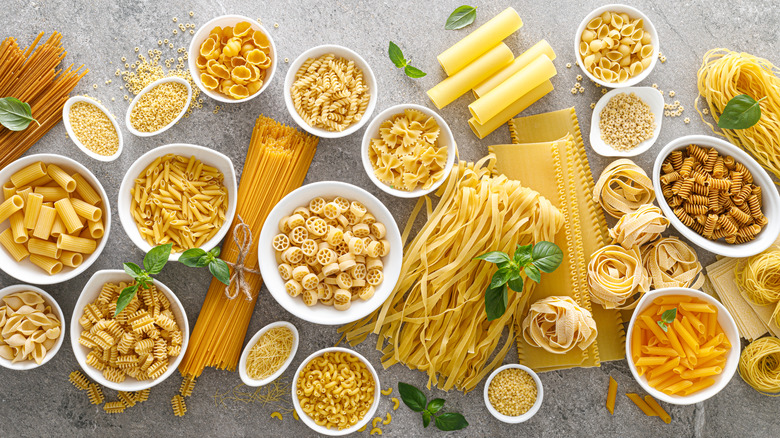Pasta Played A Key Role In The First-Ever TV April Fool's Hoax
From the farfalle versus fusilli pasta salad debate to Americanized spaghetti and meatballs, pasta is truly a darling of the culinary world, but it's also instrumental to one of the greatest pranks of all time. While you might associate April Fools Day pranks with foods like a whipped cream pie to throw in someone's face, swapping sweet vanilla pudding with mayonnaise for an unsuspecting victim, or even fish to celebrate the European "April Fish," pasta was actually one of the first widely publicized April Fool's Day foods.
In a 1957 satirical documentary airing on the BBC, a Swiss family prepares spaghetti, though not in the way you're thinking. The parody "Panorama" program depicts a spaghetti harvest, a practical joke stunt involving the supposed picking of spaghetti crops, which are nothing more than cooked spaghetti draped over tree branches. Narrated by established broadcaster Richard Dimbleby, also called the "Voice of the Nation," and known for serious wartime journalism and broadcasts, the documentary shows a family from Ticino, Switzerland as they remove limp spaghetti from leafy branches.
The family plucks pasta, collecting it in baskets as the narrator informs viewers about how frosts impact flavor and how spaghetti weevils disturb crops. Although hilarious, this stunt might've been a bit too convincing as the first TV April Fool's joke. The initial viewers of "Spaghetti Harvest" actually called the BBC inquiring where they could purchase their own spaghetti bushes.
Pasta parody fools foodies
Now, to a modern audience, this may seem like a blatantly obvious farse, but people consumed both information and spaghetti differently in 1950s Britain. Famous or infamous, depending on who you ask, for distinctive foods like baked bread and meat puddings or Scotch eggs, Britain certainly has a polarizing reputation when it comes to food.
At the time, pasta dishes weren't common meals in the United Kingdom, and many people had little to no concept of how pasta was made. The standard British menu consisted of roasted meats, fish, eggs, cheese, potatoes, carrots, greens, and tinned foods, with hardly any kind of pasta. Impacted by the strict provisions of war rationing, most British families didn't serve so-called exotic dishes like spaghetti until the late 1960s and early 70s.
Coupled with the relatively recent availability of televisions, this little hoax had a much larger impact than envisioned. The saying "don't believe everything you see on TV" exists for a reason, but with TVs only becoming household appliances in the late 1930s, folks didn't watch news programs with quite as much skepticism. In the age of the internet, the mind-boggling availability of information means we're quite familiar with the concepts of misleading media and fact-checking, but back in the day, this prank fooled all kinds of foodies. So next time you're cooking up a pot of pasta, be thankful that you can just pour it out of a box, and watch out for spaghetti weevils!

